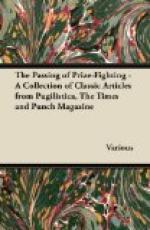“Came to me yesterday, the Dicky Bird did,” one of them would relate; “wanted advice about that fat fraud of his, Peter. ’He’s got an abrasion on the knob of his right-hand front paw,’ says he. ‘Dicky Bird,’ says I, ’that is no way to describe the anatomy of a horse after all the teaching I’ve given you.’ ’I am so forgetful and horsey terms are so confusing,’ he moans. ‘Oh, I recollect now—his starboard ankle!’ The dear babe!”
In the course of time the Antrims went into the Push, but on this occasion they refused to take the Padre with them, explaining that Pushes were noisy affairs with messy accidents happening in even the best regulated battalions.
The Padre was up at midnight to see them go, his spectacles misty. They went over the bags at dawn, reached their objective in twenty minutes and scratched themselves in. The Padre rejoined them ten minutes later, very badly winded, but bringing a case of Woodbines along with him.
My friend Patrick grabbed him by the leg and dragged him into a shell-hole. Nothing but an inherent respect for his cloth restrained Patrick from giving the Dicky Bird the spanking of his life. At 8 A.M. the Hun countered heavily and hove the Antrims out. Patrick retreated in good order, leading the Padre by an ear. The Antrims sat down, licked their cuts, puffed some of the Woodbines, then went back and pitchforked the Bosch in his tender spots. The Bosch collected fresh help and bobbed up again. Business continued brisk all day, and when night fell the Antrims were left masters of the position.
At 1 A.M. they were relieved by the Rutland Rifles, and a dog weary battered remnant of the battalion crawled back to camp in a sunken road a mile in the rear. One or two found bivouacs left by the Rutlands, but the majority dropped where they halted. My friend Patrick found a bivouac, wormed into it and went to sleep. The next thing he remembers was the roof of his abode caving in with the weight of two men struggling violently. Patrick extricated himself somehow and rolled out into the grey dawn to find the sunken road filled with grey figures, in among the bivouacs and shell holes, stabbing at the sleeping Antrims. Here and there men were locked together, struggling tooth and claw; the air was vibrant with a ghastly pandemonium of grunts and shrieks; the sunken road ran like a slaughter-house gutter. There was only one thing to do, and that was to get out, so Patrick did so, driving before him what men he could collect.
A man staggered past him, blowing like a walrus. It was the Padre’s batman, and he had his master tucked under one arm, in his underclothes, kicking feebly.
Patrick halted his men beyond the hill crest, and there the Colonel joined him, trotting on his stockinged feet. Other officers arrived, herding men. “They must have rushed the Ruts., Sir,” Patrick panted; “must be after those guns just behind us.” “They’ll get ’em too,” said the Colonel grimly. “We can’t stop ’em,” said the Senior Captain. “If we counter at once we might give the Loamshires time to come up—they’re in support, Sir—but—but, if they attack us, they’ll get those guns—run right over us.”




